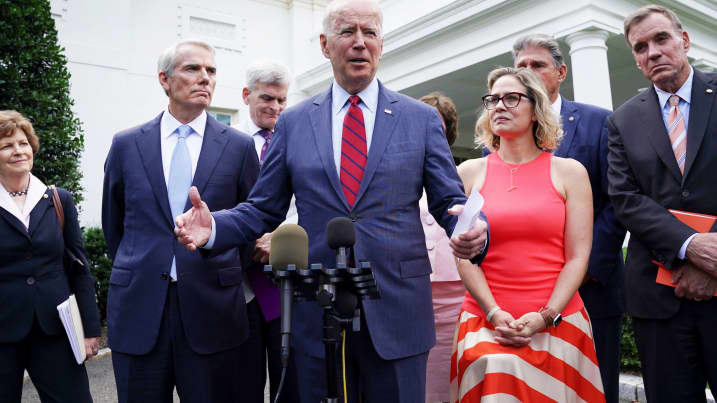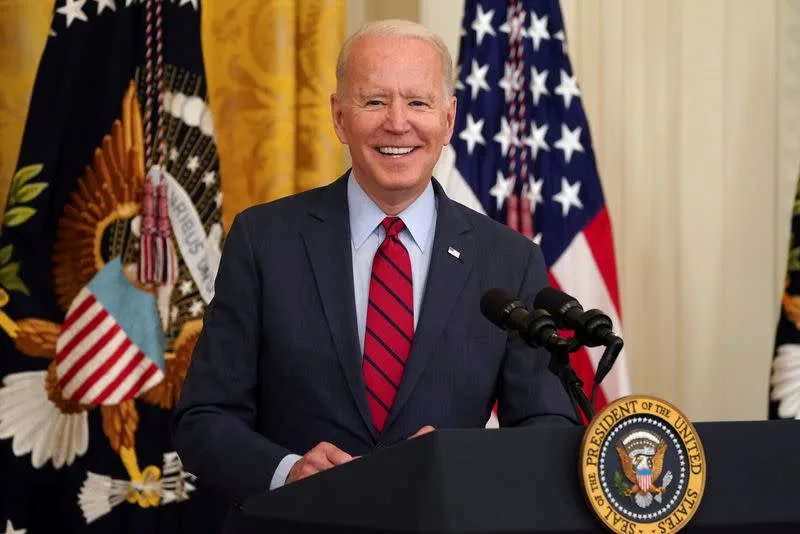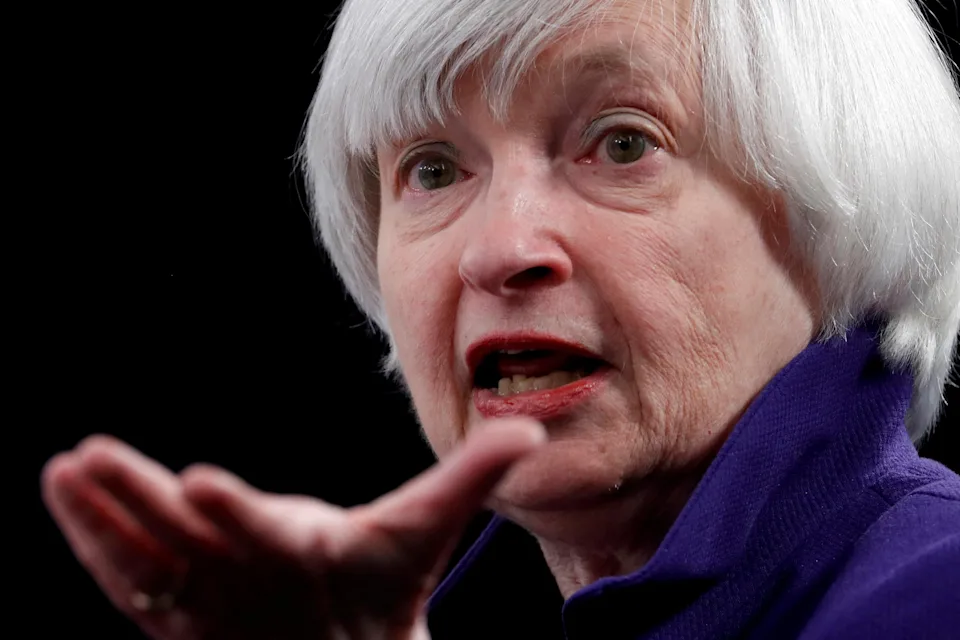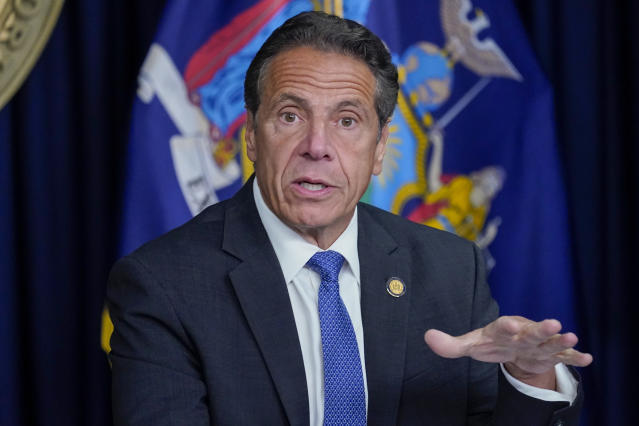Good Morning from Washington, D.C.
Last Thursday, after months of negotiations, President Joe Biden and a bipartisan group of Senators announced an infrastructure deal at the White House. The agreement includes over $1.2 trillion in spending on “traditional” infrastructure projects—roads, bridges, tunnels, rail, and broadband—all areas where Democrats and Republicans could agree. Even though it is significantly scaled down from Biden’s initial proposal, American Jobs Plan, the proposal would be the first major increase in federal public works spending since President Barack Obama’s 2009 Economic Rescue Plan.
It includes some existing infrastructure programs, but also provides $579 billion over eight years in new money to patch cracking highways, rebuild crumbling bridges, speed rail traffic, and more equitably spread high-speed internet access. The bill would also invest billions of dollars into waterways and coastlines, and $7.5 billion into financing a half-million electric vehicle charging stations, all part of Biden’s climate pledges. As we first raised in the Monday Morning Memo a couple weeks ago, the bipartisan bill dropped a corporate tax increase (a non-starter for Republicans) and would instead be paid for with a $40 billion increase in the I.R.S. enforcement budget to bring in $140 billion in unpaid taxes.
However, the President added one giant caveat Friday morning that left the White House scrambling to save the deal over the weekend. Biden said of the bipartisan deal that if this “is the only one that comes to me, I’m not signing it.” The President said that his support for the infrastructure deal is contingent upon it passing “in tandem” with a bigger bill that has been completely shaped without GOP input. Progressives have protested the bipartisan deal’s potential passage unless it’s paired with a spending bill running into the trillions and tackling climate change, prescription drugs, Medicare expansion, and many more of the Democratic Party’s progressive priorities. Several members of the Senate GOP immediately responded that they would pull their support for the deal if it is tied to a larger package passed through reconciliation, with key Republican negotiators Senators Rob Portman of Ohio and Bill Cassidy of Louisiana saying they were “pissed and disappointed” and “blindsided.”
deal over the weekend. Biden said of the bipartisan deal that if this “is the only one that comes to me, I’m not signing it.” The President said that his support for the infrastructure deal is contingent upon it passing “in tandem” with a bigger bill that has been completely shaped without GOP input. Progressives have protested the bipartisan deal’s potential passage unless it’s paired with a spending bill running into the trillions and tackling climate change, prescription drugs, Medicare expansion, and many more of the Democratic Party’s progressive priorities. Several members of the Senate GOP immediately responded that they would pull their support for the deal if it is tied to a larger package passed through reconciliation, with key Republican negotiators Senators Rob Portman of Ohio and Bill Cassidy of Louisiana saying they were “pissed and disappointed” and “blindsided.”
On Saturday, President Biden personally worked the phones to save the deal. He also publicly backtracked on his remarks and issued a clarification. In a formal statement from the White House Saturday, Biden said, “The bottom line is this: I gave my word to support the Infrastructure Plan, and that’s what I intend to do. I intend to pursue the passage of that plan, which Democrats and Republicans agreed to on Thursday, with vigor. It would be good for the economy, good for our country, good for our people. I fully stand behind it without reservation or hesitation.” He seems to have brought it back from the dead . . . at least for now. In response, Portman and Cassidy recanted their negative remarks and reiterated their support for the bill. “This week Republicans and Democrats agreed on a historic bipartisan framework and we should pass it because it is good for the economy and country,” Portman said Saturday evening. While the bill is alive for now, expect the discussion to continue to be up and down in Washington this week.
his remarks and issued a clarification. In a formal statement from the White House Saturday, Biden said, “The bottom line is this: I gave my word to support the Infrastructure Plan, and that’s what I intend to do. I intend to pursue the passage of that plan, which Democrats and Republicans agreed to on Thursday, with vigor. It would be good for the economy, good for our country, good for our people. I fully stand behind it without reservation or hesitation.” He seems to have brought it back from the dead . . . at least for now. In response, Portman and Cassidy recanted their negative remarks and reiterated their support for the bill. “This week Republicans and Democrats agreed on a historic bipartisan framework and we should pass it because it is good for the economy and country,” Portman said Saturday evening. While the bill is alive for now, expect the discussion to continue to be up and down in Washington this week.
While the White House and Congress press to get an infrastructure deal done this summer, they face another impending deadline: the debt ceiling. Treasury Secretary Janet Yellen warned Friday that the U.S. could breach its spending limit sometime during the August recess if Congress doesn’t act to raise the spending limit. Congress suspended the borrowing limit in 2019 through July 31, 2021—after that date, the Treasury will not be able to raise additional cash. Testifying before a Senate Panel last week, Yellen emphasized that the pandemic has created uncertainty around the size and timing of government payments, making it difficult to estimate when the Treasury might exhaust those measures. “Failing to increase the debt limit would have absolutely catastrophic economic consequences. I believe it would precipitate a financial crisis. It would threaten the jobs and savings of Americans at a time when we’re still recovering from the Covid pandemic,” Yellen said on Wednesday.
impending deadline: the debt ceiling. Treasury Secretary Janet Yellen warned Friday that the U.S. could breach its spending limit sometime during the August recess if Congress doesn’t act to raise the spending limit. Congress suspended the borrowing limit in 2019 through July 31, 2021—after that date, the Treasury will not be able to raise additional cash. Testifying before a Senate Panel last week, Yellen emphasized that the pandemic has created uncertainty around the size and timing of government payments, making it difficult to estimate when the Treasury might exhaust those measures. “Failing to increase the debt limit would have absolutely catastrophic economic consequences. I believe it would precipitate a financial crisis. It would threaten the jobs and savings of Americans at a time when we’re still recovering from the Covid pandemic,” Yellen said on Wednesday.
Back in New York… 
Primary Day last Tuesday brought several major story lines. In Buffalo, the City’s longest serving Mayor, four-term incumbent Byron Brown lost to India Walton, a progressive challenger running her first campaign. While Walton’s win surprised many, the trend follows several elections cycles of progressive primary upsets across New York, including in 2018 and 2020 that deeply shook up the State Senate and Assembly Majorities. In Rochester, embattled incumbent Lovely Warren—who was first elected in 2013 and was running for her third term—lost her re-election bid to City Councilman Malik Evans.
In the race for New York City Mayor, Eric Adams won 253,000 votes and has a commanding 10-point lead over progressive Maya Wiley, but the race is not over. Ranked Choice Voting—being used for the first time in a Citywide race—means that it will be a couple of weeks before a winner is finalized.
Attorney General Letitia James’ investigation into Governor Andrew Cuomo also took another step forward last week. Investigators have interviewed a senior Cuomo lieutenant and are examining the environment in the Executive Chamber going back more than a decade. Investigators spoke recently with Rich Azzopardi, a senior adviser who is one of the governor’s principal spokespeople. He is the highest-ranking current aide to Cuomo known to have been interviewed as part of the investigation. People familiar with the probe said they expected the governor’s senior aides, including Azzopardi, to be among the last questioned in the probe, which was launched in March. Speaking at an unrelated press conference on Thursday, AG James said the investigation “will conclude when it concludes.”
week. Investigators have interviewed a senior Cuomo lieutenant and are examining the environment in the Executive Chamber going back more than a decade. Investigators spoke recently with Rich Azzopardi, a senior adviser who is one of the governor’s principal spokespeople. He is the highest-ranking current aide to Cuomo known to have been interviewed as part of the investigation. People familiar with the probe said they expected the governor’s senior aides, including Azzopardi, to be among the last questioned in the probe, which was launched in March. Speaking at an unrelated press conference on Thursday, AG James said the investigation “will conclude when it concludes.”
How productive was the Legislative Session in New York?
We take a look at what did, and did not get done in our End of Session Overview.
FOR DAILY UPDATES, FOLLOW US:
OD&A in the News…
COVID-19, Voter Turnout or Effective Campaign? Analyzing How India Walton Upset a Four-Term Incumbent
 Client News: Buffalo AKG Art Museum’s Transformation is Focused on Both Art and People
Client News: Buffalo AKG Art Museum’s Transformation is Focused on Both Art and People
Becoming the Buffalo AKG Art Museum means more than giving our community a new and revitalized campus, a new name and logo. It is as much about showcasing our world-renowned collection as it is about people – the extraordinary staff; the students, families and art lovers who visit. [Read more.]
 TOP GOP POLLSTER: TO WIN, WE NEED ‘TRUMP TO GO AWAY’
TOP GOP POLLSTER: TO WIN, WE NEED ‘TRUMP TO GO AWAY’
The GOP stands on the cusp of winning back the House and Senate if it can build out its base and reach just a few more wavering voters, such as older and suburban women. But a longtime Republican pollster and co-director of the Georgetown University Battleground Poll said there is a big hurdle in the way. [Read more.]
NYS Legislature: new member spotlight
State Senator Alexis Weik (3rd District)
Senator Alexis Weik was elected to her first term representing the 3rdState Senate District, which covers much of south-central Suffolk County on Long Island, including portions of Brookhaven and Islip. She defeated Democrat Monica Martinez who was running for a second term, one of two Republican upsets in 2020.
Prior to her election to the State Senate, she served as Receiver of Taxes for the Town of Islip from 2011-2020. As Receiver, she made customer service her top priority, embracing a hands-on approach to assist taxpayers, streamline operations and improve the office’s efficiency.
Senator Weik is a former small business owner who is a strong advocate for small businesses. In the Senate, she says she will prioritize tax reform centered on small businesses.
Senator Weik serves as the Ranking Member of the Social Services and Budget & Revenues Committee, and a Member on the Committees on Civil Service & Pensions, Education, Veterans, and Women’s Issues.
She lives with her husband in Sayville on Long Island’s South Shore. The couple has three children.


 TOP GOP POLLSTER: TO WIN, WE NEED ‘TRUMP TO GO AWAY’
TOP GOP POLLSTER: TO WIN, WE NEED ‘TRUMP TO GO AWAY’ 